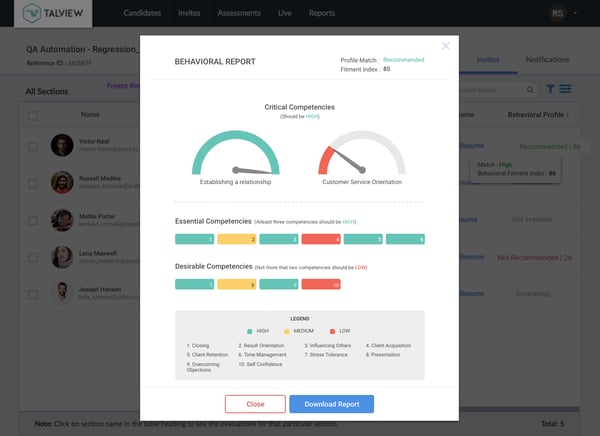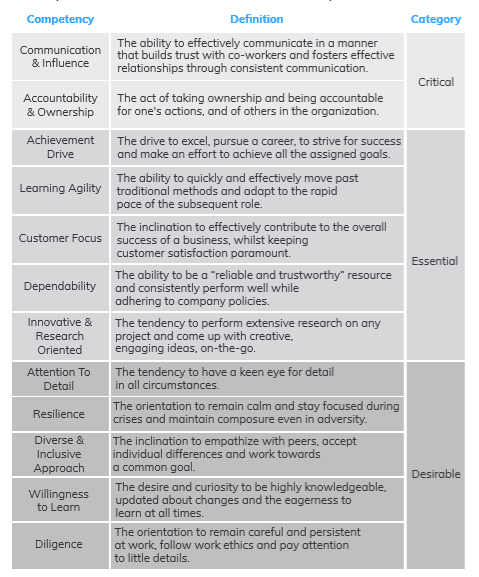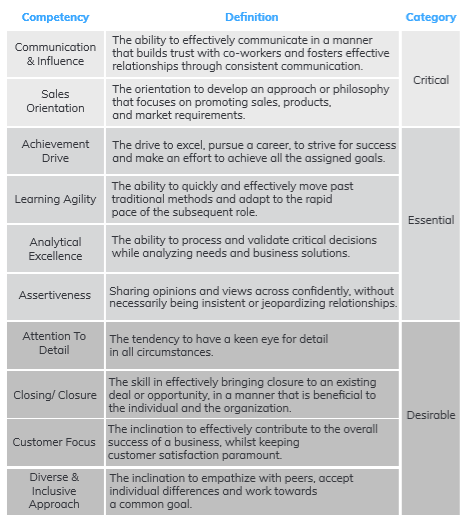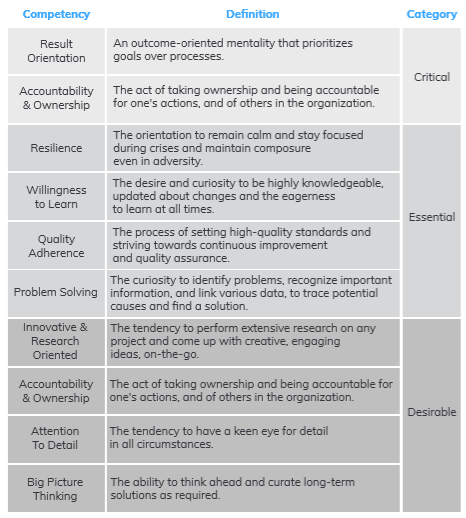As organizations have started to realize the heavy costs of a bad/wrong hire, they’ve gradually started adopting behavioral assessments — in addition to skills assessments — as pre-employment personality tests for potential candidates.
The average cost of a bad hire has been estimated at between 16-20% for positions earning up to $50,000 annually and up to 213% for executive-level positions, according to a study by The Center for American Progress. And these losses don’t even account for the time, productivity, and team spirit lost with high turnover.
Not just that, organizations now realize how extremely unreliable resumes can be. According to Monster, nearly 50% of job applicants lie on their resumes in some manner. Resumes can be embellished with white lies and be fudged to highlight only certain things and strategically hide significant details.
On top of that, if you are hiring for roles that require high-volume hiring, such as Customer Support, Sales, Management Trainee, etc., it becomes especially inconvenient to go through hundreds or thousands of resumes and even tougher to sieve through the honest ones from the fake ones.
As a result, holding pre-employment behavioral tests became the next reliable way to assess a candidate. It not only tells you if a candidate’s skills are suitable for the role they are applying for but also gives you accurate behavioral insights about the candidate’s future performance.
These behavioral insights are useful for employers to gauge which candidates can be long-term players with appropriate skills and talents and which might not fit well with the job role and the company culture.
This blog post will discuss the following topics:
- What are Pre-Employment Behavior Assessments?
- Reasons to Employ Behavioral Assessments for Bulk-Hiring
- Benefits of Pre-Employment Behavior Assessments
- Where Talview Behavioral Insights Come in the Picture
- Four Examples of Behavioral Competencies for Popular High-Volume Jobs
What are Pre-Employment Behavior Assessments?
Behavioral assessments are a type of psychological assessments that is used to observe, explain, predict, or at times even correct the behavior of test-takers. These assessments are now being used by employers as a part of their screening process to assess and predict the behavior of their potential employees and standardize their hiring process.
In addition to technical skills, every job requires a certain set of behavioral competencies from the person trying to do that job like communication skills, business orientation, leadership, etc. Pre-employment behavioral assessments test the candidates around these competencies by designing assessment questions that reveal the personality and potential of people.
Candidate behavior assessments act as a great screening mechanism that candidates usually cannot fake, unlike any other aptitude or personality tests. The questions are open-ended, have no right or wrong answers, and are not leading in any way. The candidate has no choice but to respond with what they feel is right, making such tests very reliable and free of recruiters’ biases.
There are certain competencies that are essential for specific types of jobs. So, the assessments are made differently for different roles, and for different organizations, depending on their requirements. For example, if you’re looking for a Sales Representative, you will look for a person who is business-oriented, well-spoken, and quick-witted.
Creating assessments that can assess the levels of these competencies in a person can ensure that you never hire someone that does not fit your standards. You could either take help from an industrial psychologist or look at the job competencies of the people already working in the same position.
Then accordingly, you can create an assessment for the required role or use third-party software that can help you create such tests.
Why You Need to Employ Behavior Assessments for Bulk-Hiring
Here are the main reasons to opt for pre-employment behavior assessments for effectively screening candidates:
1. Meritocratic Hiring
When hiring for bulk roles, recruiters sometimes tend to overlook certain red flags on a resume that they would otherwise not select when there’s no pressure of filling many positions.
With traditional ways of hiring, recruiters stick to resumes and cover letters to assess a person’s capabilities. They could go a step ahead and give them a preliminary phone call. While all this was great a few years ago, these techniques, if used to hire in bulk, would require several man-hours and cost along with the risk of shortlisting a bad candidate.
Whereas pre-employment behavior assessments can give you an accurate picture of a candidate’s behavior through a set of questions that can help you deduce whether the candidate will be a good fit for the role or not.
This can help you to get a realistic picture of the candidate’s skills and potential. You don’t have to assume or predict their behavior to make decisions.
2. Unbiased Hiring
Considering that traditional interviews give very little information about the person or their abilities, it’s not unfair to say that they function considerably on guesswork or quick decisions. Guesswork in recruitment without actual data points can lead to disasters in the form of heavy costs, multiple wrong hires, demotivated teams, and eventually, lowered productivity levels.
A behavior assessment allows fair judgment of candidates and their performance purely on the basis of their scores or grades on the assessment. Candidates will only be qualified if they possess the skills that you have benchmarked, and not if they share the same college, hometown, language, or any interests with the interviewer.
Read here about several interviewer biases and how to avoid them while hiring.
3. Structured Interview Process
Having pre-employment behavioral assessments as a dedicated screening method streamlines the entire hiring process. With no exceptions, these assessments, apart from being effective predictors of workplace behaviors, also allow you to predict the outcomes of each assessment.
This can help you have a structured interview process with minimal scope for surprises. When it comes to hiring for volume positions, such as a Customer Support Executive, behavioral assessments can help streamline the kind of talent that finds its way through your interview process.
For example, one of the leading global BFSI brands decided to hold behavioral assessments to hire for the role of a Relationship Manager. Talview helped them screen and select 1200+ candidates in 6 months' time. They even closed the position without meeting even a single candidate in person.
This also helps organizations save time spent on “resume spammers” who are people who send out their resumes with minimal thought or effort and are uninterested in actually applying for a role. A screening test ensures the seriousness of the candidate to take up the role.
4. Different Assessments for Different Roles
As each vacancy in your business requires a different set of competencies, having the same test for each role just wouldn’t suffice. For example, a Management Trainee is supposed to have great interpersonal communication, be influential, and have accountability and ownership. They should not be assessed on skills such as empathy, resilience, and research orientation that might be useful for other roles.
Unlike aptitude or skill tests, behavior tests for employment can be made differently for different roles. Each role will have a different competency assessment that will test only the competencies required for that role.
This step helps in providing structure to interviews and further helps the employers and recruiters to make informed hiring decisions and know what to expect from the candidates that get selected eventually.
5. Data-Driven Hiring Leading to Higher Productivity
In an article published in the American Psychologist Journal, researchers found that using clear and accurate personality measures for pre-employment screening can predict performance in all occupations and increase organizational productivity.
Unlike a resume or face-to-face interview, behavioral assessments produce objective, quantifiable data that provides insight into important personality traits of applicants, such as motivation, conscientiousness, extraversion, leadership orientation, cooperation, efficiency, critical thinking, etc., that helps organizations hire quality talent.
You will have proper data on the kind of skill sets that your employees possess that can prove to be beneficial for both you and your employees to reach your full potential.

Talview's behavioral assessment report
Benefits of Pre-Hire Behavioral Assessments
1. Reduced Turnover
According to Harvard Business Review, as much as 80% of employee turnover is due to bad hiring decisions.
When you hire people with the right skills and suitable temperament, your organization and its employees both will thrive. Having accurate pre-recruitment behavior assessments help you find the people whose behavior and even goals align with that of your organization.
Such screening techniques ensure that all new employees have the basic aptitude required to do the job along with the appropriate personality to feel comfortable with their work and environment, leading to increased retention.
These factors may reduce the likelihood of employees being let go for performing poorly as well.
2. Culture Fitment
When hiring in bulk, it gets tough to always check the candidate’s cultural fitment, personality type, or temperament. That’s one of the biggest benefits of having behavior assessments for hiring employees.
It gets easy to check whether the person is empathetic, resilient, detail-oriented, analytical, a team player, or anything else that fits well with the role and organization they will be hired for.
This helps employers to make more data-driven decisions for the benefit of the employees, by evaluating group dynamics, including how teams are structured, productivity, conflicts, and team vs. team performance and highlighting areas for improvement.
3. Lower Hiring Cost
Because aptitude is such a consistent indicator of future performance, implementing this kind of assessment can drastically reduce the costs associated with a turnover by limiting the amount spent on hiring and training employees that may be ill-equipped for the position.
Not just that, having a behavior assessment early in your hiring process helps you to cut down many other redundant steps that you would otherwise have to take to learn about your candidates.
The more you know about your candidates, the less likely you are to hire misfits, eventually helping you to reduce costs associated with a bad hire.
4. Diverse Teams
Diverse teams perform better. In a study from 2018, McKinsey found that companies with gender diversity in their management teams were 21% more likely to be profitable, while those with ethnic and cultural diversity were 33% more likely.
Whether you like it or not, humans are prone to having subconscious biases. And if recruiters are not consciously aware of them, this can hinder the overall productivity and diversity of organizations.
With the help of standard behavior assessments, you would be able to give all applicants an equal, unbiased opportunity to showcase themselves purely on the basis of their skills. This ensures you get the best talent from all walks of life.
Where Talview Behavioral Insights Come in the Picture
Talview Behavioral Insights or TBI is a behavioral assessment tool by Talview that uses psycholinguistics as a theoretical background to create a behavioral profile of candidates. It is the world’s first job competency measurement tool that measures behavioral traits with the help of GloVe/LIWC.
TBI uses asynchronous video interviews, open-ended behavioral questions, tone analysis, and emotion recognition to build a candidate’s wholesome behavioral profile from their natural speech during the video interview.

Voice fingerprinting and background noise detection with TBI
Based on established models, such as the Big 5, TBI adds AI-powered natural language processing to process data and help organizations make unbiased hiring decisions.
What Makes TBI a Superior Tool for Pre-Recruitment Screening?
Traditional written behavioral assessments for hiring such as DISC can take up to 30-45 minutes to complete and could be faked. Knowing socially accepted answers help candidates fake MCQ-based psychometric tests, reducing the accuracy of their behavioral analysis.
One of the biggest benefits of using TBI for screening candidates is that it combines the benefits of a recorded video interview and predictive assessments into one 10-15 minute screening step and gives you a self-calibrated report of the candidate.
The TBI engine analyses the subtext of a candidate’s video or written responses to the interview questions which cannot be easily faked by candidates. These questions don’t necessarily have to directly align with the competency being measured but still do the job.
TBI functions on a bank of industry-accepted competencies that can be combined together to make up different job descriptions in different industries.
Examples of Behavioral Competencies for Popular High-Volume Jobs
To give you a peek into how TBI works, here are the standard configurations of TBI available for four high-volume roles, as examples. Each consists of a set of Critical, Essential, and Desirable competencies that the candidates being selected for the role must have.
Management Trainee:

Customer Support/Customer Sales Representative:
.png?width=473&name=Screenshot%20(1721).png)
Sales - Entry Level:

Software Developer:

Conclusion
Behavior assessments prove to be a highly reliable method to screen and find the right talent and reduce the number of steps in the hiring process. By using it correctly, organizations can find the right culture fit for themselves and candidates can find employers who understand them.
.png)







Leave a Reply